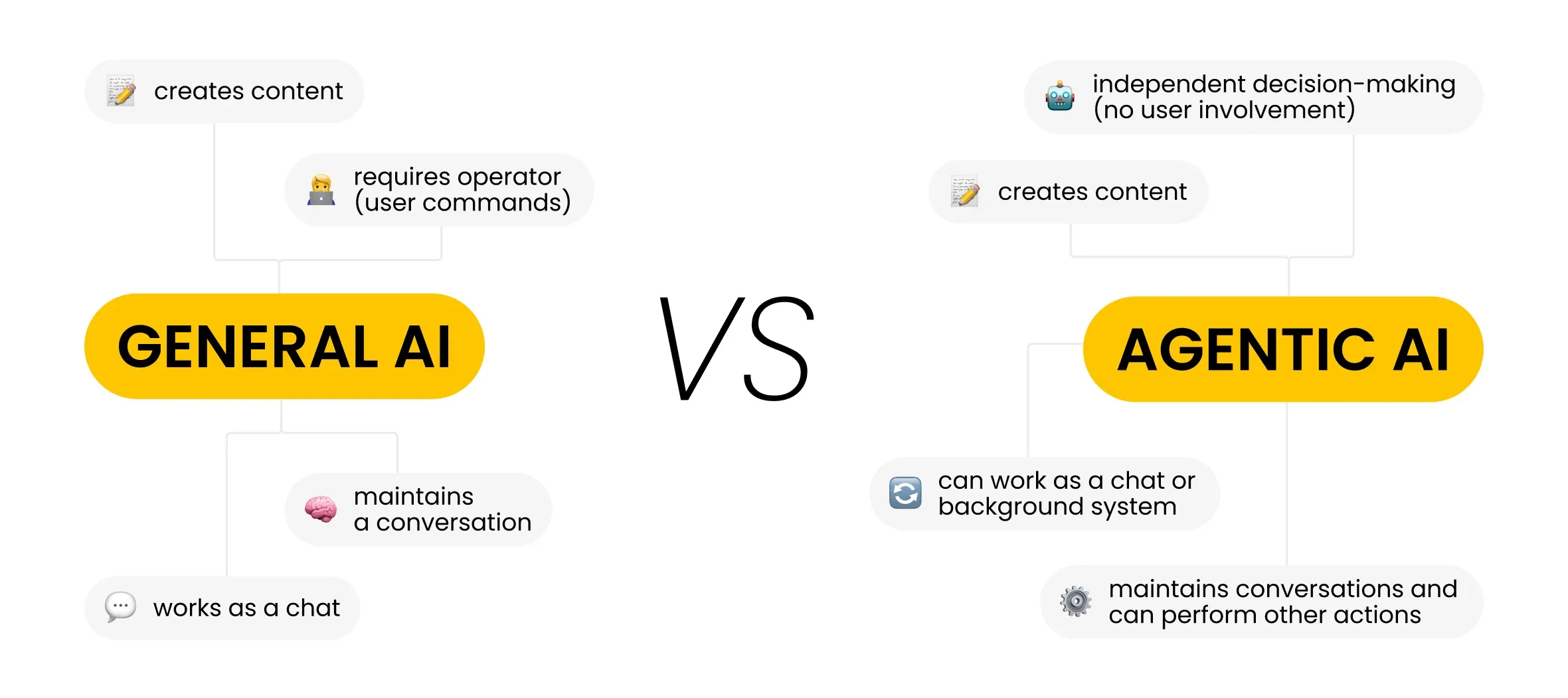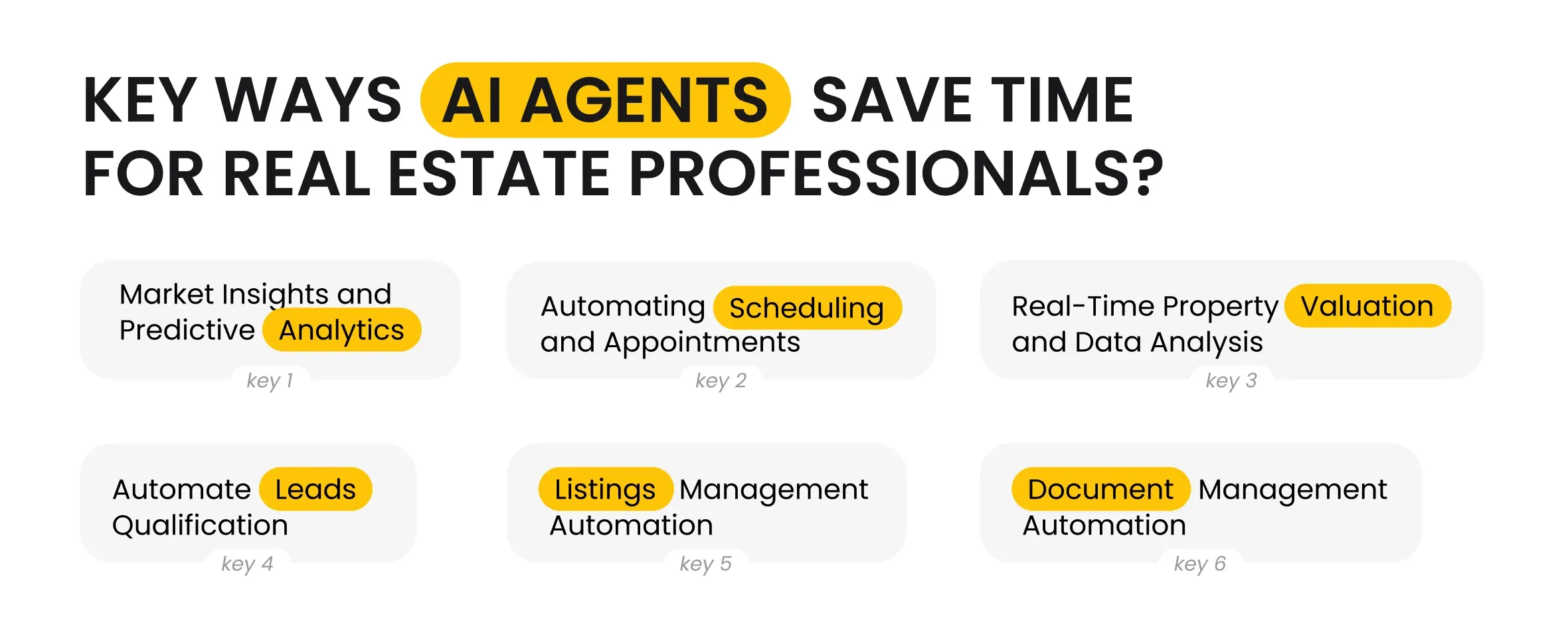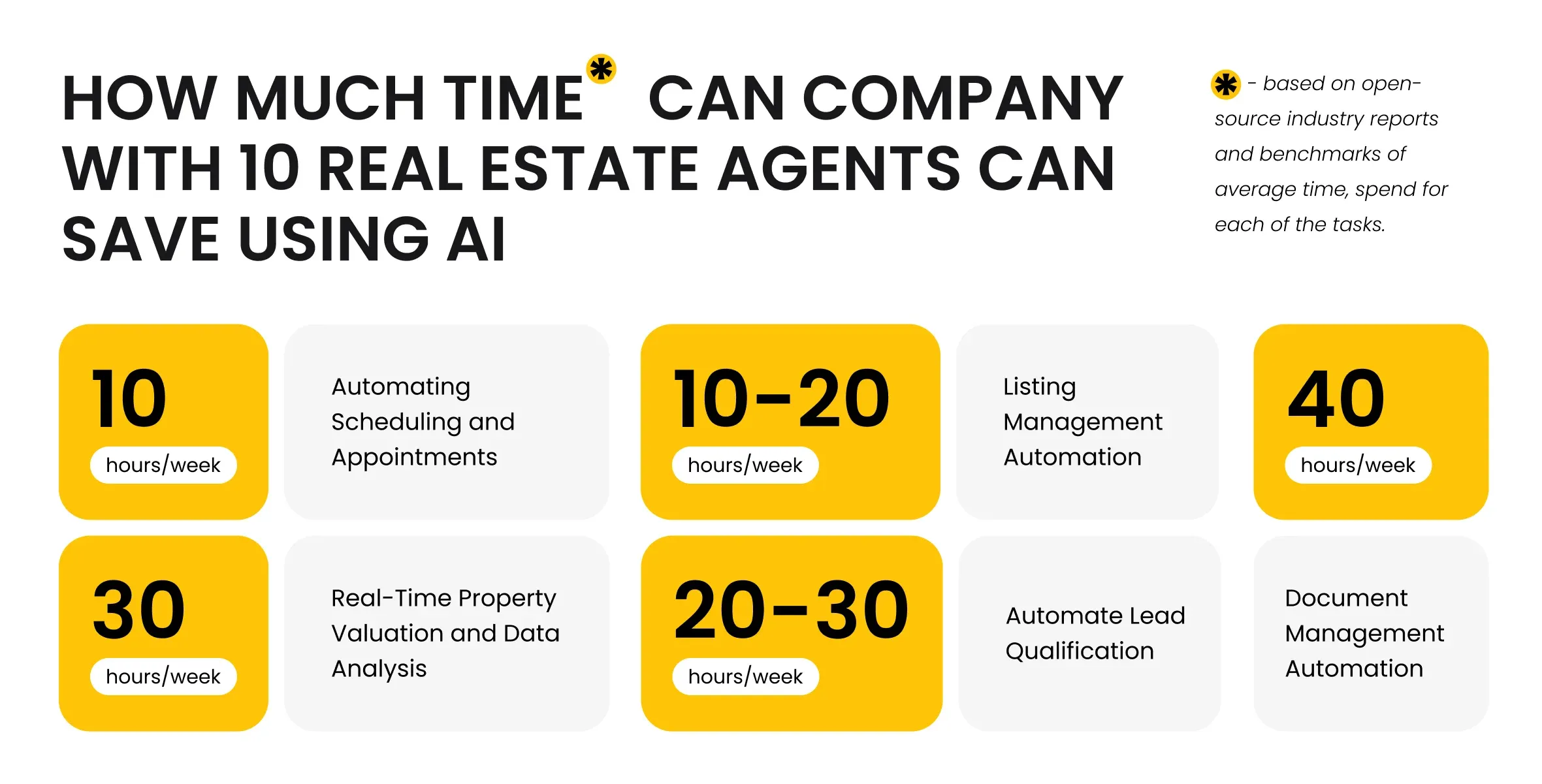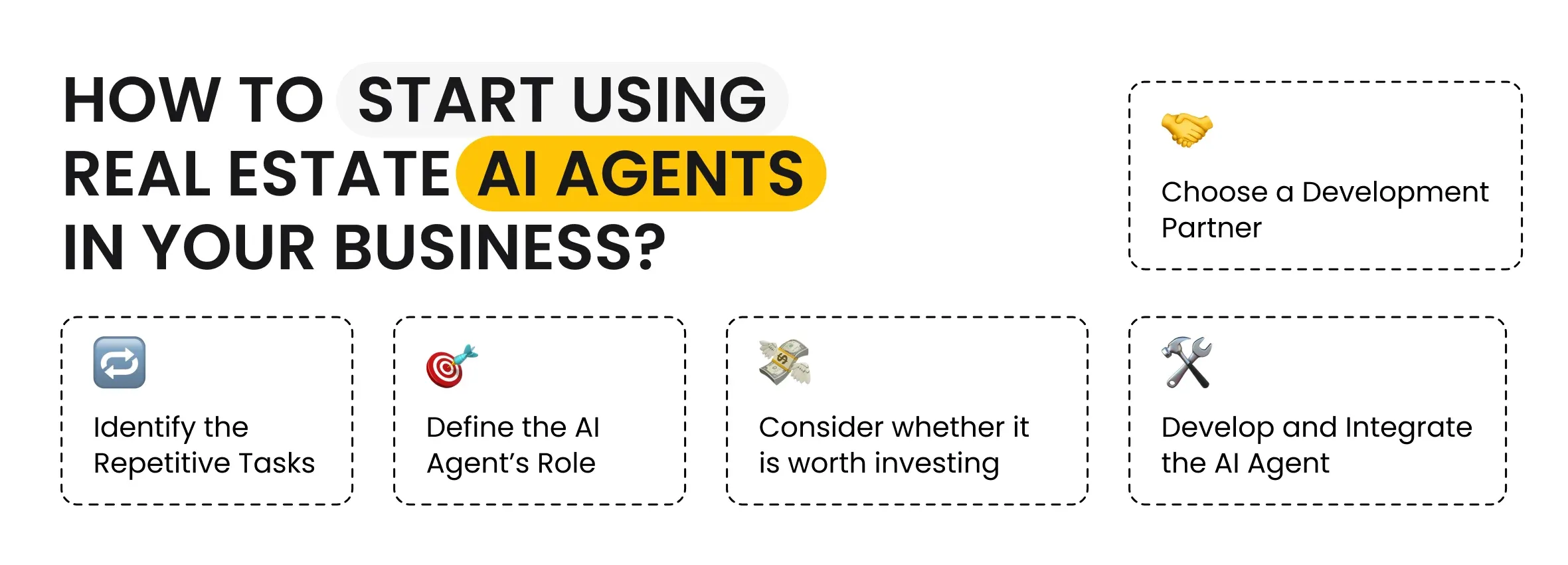How Real Estate AI Agents Are Helping Agents Save Time?
May 09, 2025 • 177 Views • 23 min read
Tetiana Stoyko
CTO & Co-Founder
Artificial intelligence is dead, long live the AI! Investments in AI-powered PropTech tools in the real estate industry have already reached 630 million US dollars as of 2023, and their role in transforming this sphere is still growing.
However, if you still haven’t adopted modern AI solutions powered by ChatGPT, Gemini, or their alternatives in your business, don’t worry. We might have another, even more powerful solution to consider.
Real estate AI agents are a new trend in PropTech. Agentic virtual assistants are quickly gaining popularity in multiple fields, and property management is no exception. So, what makes AI agents so special, compared to more traditional “generative artificial intelligence”, and what exact benefits or advantages can they bring to your business?
General vs Agentic Virtual Assistants
Before delving into the topic, we must define the two technologies' core differences.
While the concept of artificial intelligence does not require further explanation, the differences between existing models warrant a brief description. Among the various terms and ideas, we should pay the most attention to the two dominant types of AI solutions, which already have real-life examples: generative and agentic artificial intelligence models.

Generative AI is the most popular and widespread example of such software currently. As the name implies, this technology generates new content based on data it can access and process. The previously mentioned ChatGPT, Gemini, Claude, and many others are ideal illustrations of its possibilities.
They exist primarily in a chatting format, where users can set the parameters and prompts for a task, and the model will fulfill the request using the information it knows. However, the main issue with such solutions is the built-in limitation: they are reactive, i.e., they are not autonomous by default, and they require an operator (user) to set the tasks.
Agentic AI, on the other hand, is based on similar principles. Still, it is proactive, meaning that such software is more autonomous and can work without human intervention, make its own decisions, set goals, send and fulfill requests, etc. Simply put, agentic artificial intelligence is the next generation of generative AI.
The self-sustaining nature of AI agents makes them an advanced software tool that can easily automate multiple processes and significantly reduce expenses by streamlining many time-consuming tasks, tracking operational progress, and making urgent decisions when needed.
Top Time-Consuming Tasks in Real Estate
The core reasons for integrating an AI real estate agent are to streamline repetitive and time-consuming tasks, reduce operational expenses, and reallocate resources, such as employee time and skills. Still, some repetitive tasks are simple enough to be automated using even generative artificial intelligence models.

The most suitable operations in the real estate business that various AI-powered solutions can easily cover include:
- Responding to client inquiries
- Scheduling and calendar management
- Lead qualification and follow-up
- Listing management and data entry
Client communication is crucial for any business. It implies multiple services, starting with customer support, and ending with fixing bugs or integrating in-demand features. Services aimed at communicating with customers can be at least partly streamlined using AI-powered conversational chatbots, without investing heavily in software development, using customized open-source solutions.
Scheduling and calendar management are yet another essential and repetitive task that must be handled daily because they directly impact other operations and business efficiency. From this point, simple generative AI is not enough: streamlining such functionality requires software to be autonomous and able to make its own decisions. Therefore, covering such repetitive tasks is possible only using an AI real estate agent or similar solutions.
Lead qualification and follow-up are highly consuming processes, including data gathering and analysis, relevance checking, and lead profiling. Despite being relatively simple, such tasks require a lot of manual effort and attention to detail, suggesting gathering information from multiple sources, sorting it, and linking it all together, which might take hours of a professional’s working time.
Listing management and data entry are highly industry-specific services. Creating, managing, and updating such property lists requires a lot of time and effort from real estate agents. Moreover, such tasks are repetitive and must be constantly updated, which additionally takes time and effort. Nevertheless, property listing and data updating are highly automation-friendly: they can be templated and are sorted by the same aspects. Once again, real estate AI agents are an excellent software solution for streamlining these processes.
Key Ways AI Agents Save Time for Real Estate Professionals

So, how can an AI real estate assistant help your team save time and improve cost-efficiency? Long story short, AI agent development services can offer numerous solutions for the property industry, including:
- Automating Scheduling and Appointments
- Document Management Automation
- Real-Time Property Valuation and Data Analysis
- Automate Lead Qualification
- Market Insights and Predictive Analytics
- Listing Management Automation
Automating Scheduling and Appointments
As mentioned above, unlike generative solutions, a real estate AI agent is more autonomous and can make decisions based on available information. So, by linking it to your corporate or even private calendar, you can delegate scheduling and planning appointments to your virtual assistant, allowing them to plan your week based on your workload and data from your calendar.
Therefore, an AI assistant can efficiently plan your meetings and other appointments. It can also automatically reschedule your plans if they change or update to accommodate your needs and preferences.
Usually, dealing with the calendar and planning your week or month takes time, and they are protected from last-minute changes, eventually making you lose your time and opportunities to use it for good. Imagine how you can benefit from automating all this planning routine and dealing with more urgent or essential tasks instead! Besides, such a scheduling assistant is a much more scalable solution that will deal with routine planning not only for you, but for a whole company at once!
Such an impact might seem insignificant at first. However, a real estate business with 10 agents can save up to 10 working hours a week company-wide.
NOTE: This is a very rough estimation. You should contact a leading real estate software development company like Incora for more accurate numbers. Based on your actual business and team scales, we can evaluate the impact of this and other benefits from such integration.
Document Management Automation
Another potent feature of AI-powered agents is improved data and document management, as well as the possibility to partly automate some related operations.
Let’s start with the obvious: data management. It is one of the core operations in modern business that utilizes software solutions. Long story short, information plays a crucial role in our lives, and the more data you have, the more successful you can become. Data management is related to all operations and business processes, starting with a basic understanding of your target audience or its needs and ending with complex calculations, predictions, and forecasting of future industry trends.
So, while automated scheduling helps save your resources and achieve better efficiency, streamlined data management directly impacts countless processes within your work. It can significantly boost your competitive advantage and help make more informed and accurate decisions to improve your business.
Moreover, data management includes multiple related operations like data mining, gathering, processing, sorting, profiling, linking, and summary. These operations require constant attention and employee involvement and are among modern businesses' most time-consuming operations. It is fair to admit that data-related automation is an endless challenge, which has been discussed for decades.
Many modern third-party solutions and services offer solutions to streamline some of them. However, agentic artificial solutions and linked software changed the game. They created a new elevated standard for such operations, offering much more advanced and autonomous data management services, capable of covering multiple tasks at once.

For example, a proper real estate AI agent can cover almost the whole data processing pipeline by scraping any updates from defined sources, processing and sorting new inputs, and updating the most relevant parts in your databases, according to predefined templates. AI-driven solutions can summarize large data arrays, find patterns, and identify potential trends.
On the other hand, AI-powered document management solutions are limited as of today. Unfortunately, there are no successful real-life examples of full-fledged documentation management by AI. Regardless of their specifications or training, modern models can be trusted to operate necessary documentation independently.
Still, that doesn’t mean they can’t be helpful for such operations. For example, virtual assistants responsible for data processing can notify your team about the latest changes and identify which documents they could affect, making pinpointing outdated ones easier.
Thanks to services such as auto-filing, template generation, e-signing, and contract parsing, a real estate business with 10 agents can save up to 40 hours a week.
Real-Time Property Valuation and Data Analysis
Autonomous virtual assistants for real estate can help with other industry-specific tasks like property valuation. The core feature of such solutions is advanced data analysis of any information they can access.
Still, apart from using such services for niche and routine tasks like lead qualification, sales and marketing data gathering and creating statistics, or orchestrating background data-based operations, agentic AI for PropTech can be involved in property valuation and maintenance practices.
Simply put, you can give it instructions on evaluating property, what aspects or qualities you look for, etc. To benefit even more, you can use it to reach new clients or scale your property lists by finding suitable assets on the Web. As a result, your employees can get notifications and recommendations on various real estate assets you might want to add to your portfolio, boosting your team’s efficiency and saving time.
Additionally, such solutions can improve the maintenance of current assets: by linking AI to your maintenance data log, you can set up a smart notification system that will remind your employees about locations worth visiting or renovating.
As a result, property valuation and data analysis, backed up with an agentic AI real estate assistant, a real estate company of 10 agents can save up to 30 hours each week.
Automate Lead Qualification
Automated lead generation and qualification are other ways to use the excellent data analysis feature offered by AI real estate agent solutions.
By training your agentic AI and clarifying the lead qualification algorithms, you can set up a background system capable of finding potential clients and profiling them based on various factors you are interested in.
Such systems can also handle multiple data types, automatically updating your lead database. Finally, they can track many lead-related metrics, such as bounce rate and user engagement on your website or app, pinpoint issues or inefficiencies, and automate your marketing and sales workflow.
Depending on the lead qualification features and services that will be streamlined using artificial intelligence, a team of 10 real estate agents can save around 20-30 working hours a week.
Market Insights and Predictive Analytics
Another potent feature of such software integrations is the possibility of predictive analytics. Artificial intelligence solutions are excellent tools for template and pattern recognition.
Thus, by feeding it your personal or real estate market historical data, you can ask agent AI to look for correlations and predict potential changes. At the moment, most such predictions will be partly accurate.
Don’t rush into completely outsourcing your market or business analysis to a software solution, regardless of how advanced and autonomous it is. Nevertheless, using it as an additional instrument for your in-house analysis team won’t harm.
AI-driven market insights and predictive analytics can save a property business with 10 employees around 20 hours per week.
Listing Management Automation
Eventually, an AI real estate agent will be a great addition to your listing management system, providing the valuable services mentioned above.
Once again, despite the autonomy of such artificial intelligence solutions, consider them as helpful tools for your specialists, not a solution to replace them. These are just more intelligent and independent versions of long-forgotten Clippy and other virtual assistants: they can suggest solutions for issues or ways to improve or optimize the workload.
You should use agentic artificial intelligence's autonomy capabilities only when the processes are straightforward, so that automation won’t cause other issues or mistakes. Otherwise, your team should always support critical decision-making or oversee complex or scalable tasks.
Depending on the scale and complexity of listing management automation, an average company with 10 real estate agents can save approximately 10-20 hours each week.
How to Start Using Real Estate AI Agents in Your Business?

Knowing the benefits of agentic artificial intelligence and how it can help your team save time, you might wonder how to integrate AI in real estate. Long story short, this process is very similar to other software integration approaches:
- Identify the Repetitive Tasks
- Define the AI Agent’s Role
- Choose a Development Partner
- Consider whether it is worth investing
- Develop and Integrate the AI Agent
Identify the Repetitive Tasks
First, you should define repetitive tasks that must be automated. As we already mentioned, the only bulletproof way to use a real estate AI agent's complete autonomy is to streamline repetitive processes that can be templated.
So, your automation and integration project must initially begin by learning about your ongoing processes and identifying what can be improved or streamlined.
Define the AI Agent’s Role
The next step would be defining the role of your integration: whether it will be a virtual assistant, suggesting your employees potential ways to speed up some processes or resolve specific issues, or a full-fledged automation tool, running in the background? Or, do you want both solutions for the same project?
At this stage, you are shaping your future software development project, choosing a tech stack, defining the core goals to achieve, and defining the features to embody.
Choose a Development Partner
After clarifying your software requirements and specifications, you can find an appropriate software development team with experience in real estate app development services and expertise in working with AI solutions.
Judging from our experience, we recommend finding niche-experienced developers familiar with both your industry and the desired technology. Such specialists are more aware of the industry specifics and limitations, making the development process seamless, faster, and more efficient. Obviously, developers also must know how to deal with the technology they will integrate.
The best way to check your candidates' expertise is to examine their case studies and find their profiles on b2b platforms like Clutch and GoodFirms. There, you can read reviews from their previous clients, learn more about the industry expertise, find various statistics and infographics on their work, etc.
Consider Whether it is Worth Investing
After finding the most suitable development candidates and interviewing them, you should have rough project estimations from the teams. Use this data to run the numbers once again and define whether your company will benefit from such an investment in the first place.
Frankly, software improvement and scaling are always beneficial in the long term. Nevertheless, not all businesses are ready to spend money upfront, expecting revenue in the distant future. So, before initiating your real estate AI agent development, estimate the value of this project and decide whether you are satisfied with it.
Develop and Integrate the AI Agent
Finally, if all previous stages are completed and you are pleased with your estimations, you can start developing or integrating the AI real estate assistant. To be honest, many business owners also forget about the training stage of artificial intelligence.
After implementing an AI solution, you should also spend some time and resources training it and teaching it how to perform tasks you want. Also, don’t forget to test it to ensure it operates as expected before actually using it.
What’s your impression after reading this?
Love it!
1
Valuable
1
Exciting
1
Unsatisfied
1
FAQ
Let us address your doubts and clarify key points from the article for better understanding.
How do AI agents handle client communication?
AI agents handle client communication by using natural language processing to understand queries, generate relevant responses, and maintain context throughout conversations, often integrating with CRM systems to personalize interactions.
Can AI agent help with writing property descriptions?
Yes, AI agents can help write property descriptions by analyzing property details and generating clear, engaging, and tailored listings quickly.
How secure is client data when using AI agents?
Client data can be secure with AI agents if proper encryption, access controls, and compliance with data protection regulations (like GDPR) are in place.
How long does it take to develop and implement a real estate AI agent?
Developing and implementing a real estate AI agent can take a few weeks to a few months, depending on its complexity and required features.
YOU MAY ALSO LIKE
Real Estate
Clutch: Incora Is Among the TOP 10 Best Real Estate Software Development Companies Worldwide!
Must-Have Features for Successful Real Estate Mobile App Development in 2024
Real Estate App Development vs Web Development: Which is Right for Your Business?
Let’s talk!
This site uses cookies to improve your user experience. Read our Privacy Policy
Accept
Share this article